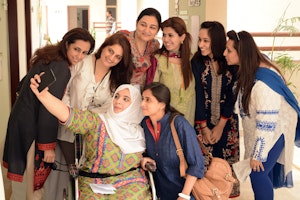A School Grows in Punjab
By Yumna Rizvi
The school management committee chair for Government Elementary School Ghaziwal Khurd in Narowal, Punjab, smiled when I asked him what the plans for the future were. “We have just understood what we can do, and are just learning about ways in which we can do things. Just watch us and see all that we will do over the next few years.”
In one year, the school has undergone significant change. It now has working bathrooms, along with an electric water cooler. The brick walls surrounding the school are not bare anymore, but through wall chalking conducted by students and teachers, are colorful with sayings written in Urdu. There is no longer just dirt; plants and flowers line up along the entrance to the building.
The teachers received training through a series of workshops focused on improving education quality as well as management. Each of the 10 project schools in the Narowal district received customized data entry software and training for teachers and administrators that will help improve the overall management of the school. The trainings have been successful in building up the morale of the teachers. And now the teachers, with a boost of confidence, have requested more training in order to improve their skills.
The improvement in school infrastructure and teachers is clear, not only in appearance but also results. In one year, GES Ghaziwal Khurd has had a 119% increase in enrollment. It is very different from the dilapidated state it used to be in. The front lawn used to be a pool of stagnant and smelly water used as a garbage dump by the surrounding community. Today, there is a playground with a swingset for the students.
But it was not all done in a day, nor was it all done alone. MOJAZ Foundation, a microfinance organization that disburses microloans to poor and marginalized families, with the help of the Open Society Foundations created this model, which they hope can be replicated across government schools in rural Pakistan.
The model relies heavily on the help and involvement of the local community. MOJAZ held meetings with various community members to form school management committees. Ten committees were made; one for each of the schools. Each committee consists of 60 percent parents, and the remaining 40 percent is teachers and general members. Members play an active part in the execution of the project and are linked with relevant government agencies.
The purpose was to encourage the community’s involvement in the decision-making process related to improving the quality of education, and to develop authentic local leaders who could take the project further. MOJAZ conducted a survey in each of the schools to find out what kind of problems it was facing. After sharing the results of the survey with the committees and stakeholders, a report was compiled through which School Education Improvement Plans were prepared.
Some of what the schools have today is due to the local philanthropists who donated land, plants, uniforms, water coolers, and playgrounds. However, MOJAZ also has an idea for how to create a self-sufficient financial system—through tunnel farming, an agricultural technique akin to a greenhouse.
Land donated by local philanthropists, with technical and financial support from MOJAZ, was developed into a tunnel farm. One farm for one school, with an endowment fund provided to each school to be invested in the farm.
Orientations were organized at a model farm in Kartapur, in Narowal, and members of school management committees were trained in the operation and maintenance of tunnel farms. Committees also organized student trips to the tunnel farms. The purpose of the trips was to provide an opportunity to students where they could learn about agriculture, which is an important source of income in Narowal. The farms were established in October 2012, and the first crop was ready for the market in March 2013.
The model is still under development. The tunnel farms need to be made sustainable, with a pool of savings to ward off temporary setbacks. The school management committees need to become entrenched enough to be able to take things forward even if MOJAZ is not there. But the idea of using community inputs to raise donations for the school, have productive activities to provide an income stream for the school, and manage and implement improvements in education is worth pursuing.
In just one year the model has shown significant promise. Overall, there has been a 12 percent increase in enrollment for the 10 schools. The question remaining is: Will this model be replicable and scalable for a significant number of other schools in rural Pakistan?
Until June 2014, Yumna Rizvi was a program assistant with the Open Society Foundations’ Pakistan office.


